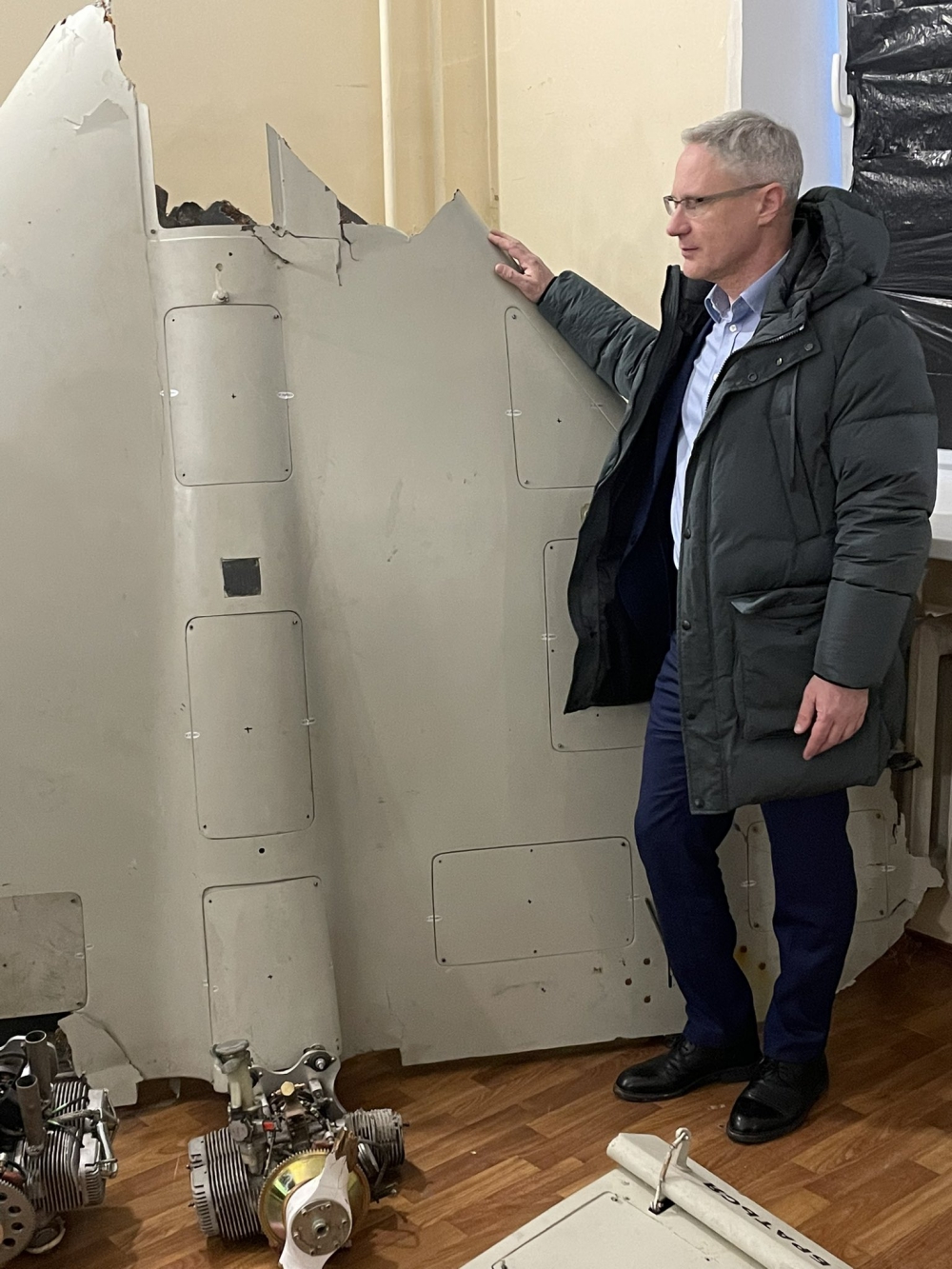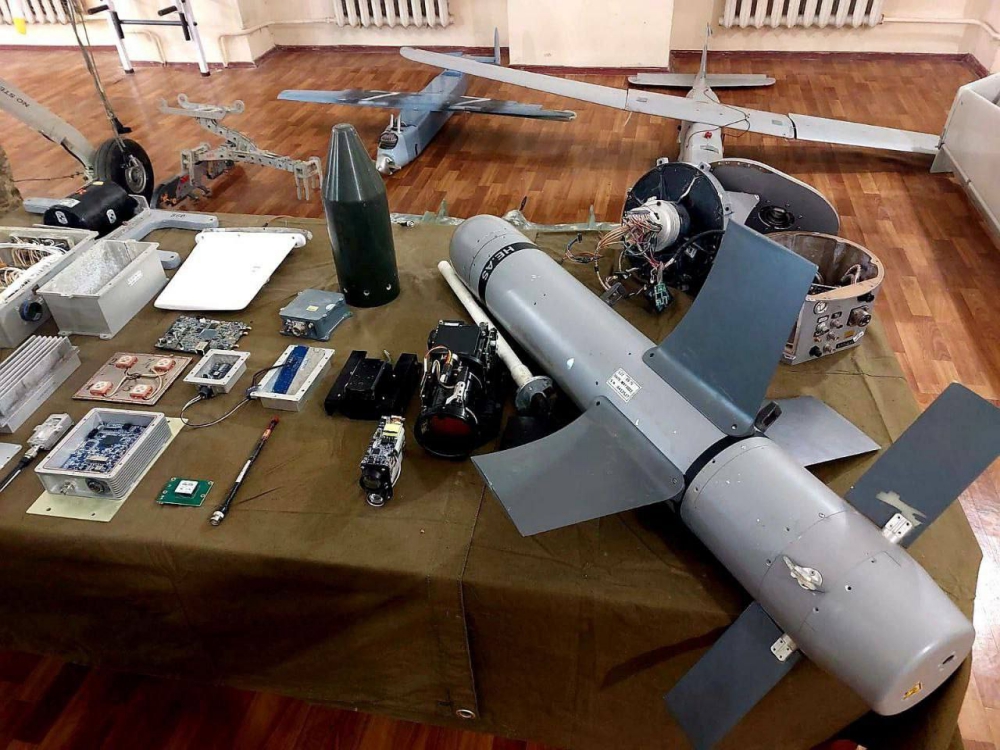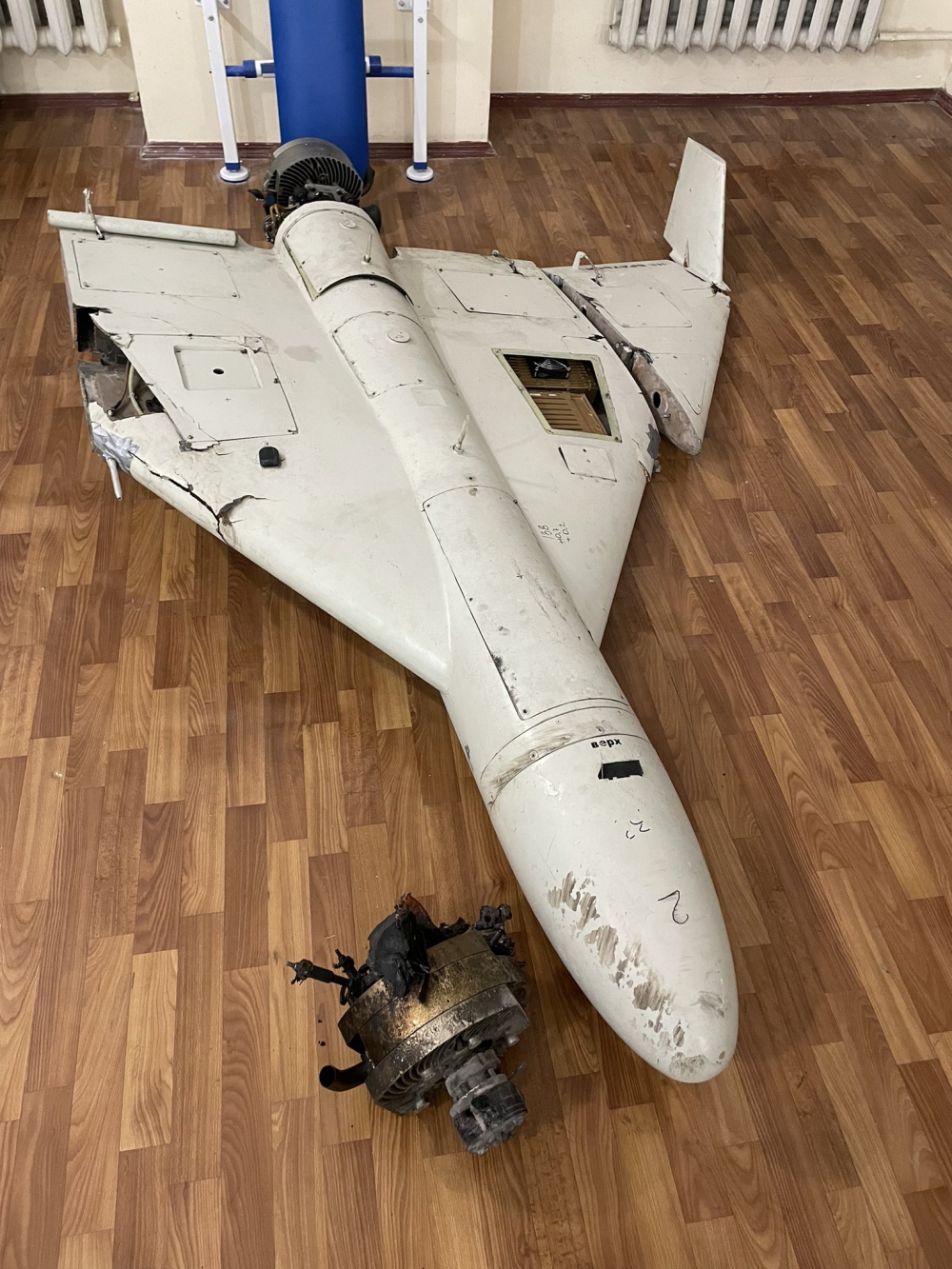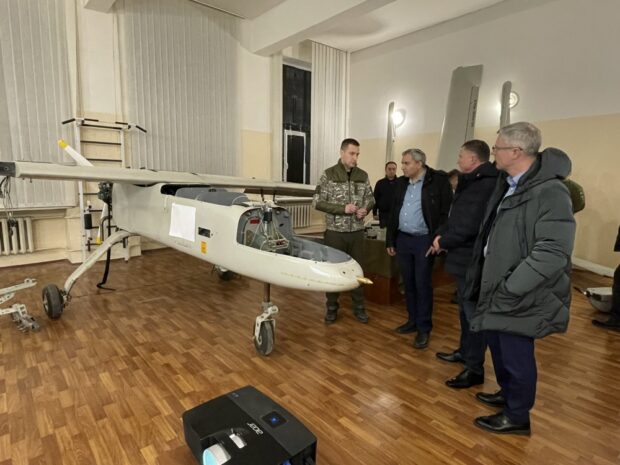Israeli political leaders from the ruling coalition, also Members of the Knesset (Parliament), visited a Ukrainian facility where they examined downed Iranian-origin drones. The visit has both military and political significance.
Members of the Knesset Ze’ev Elkin and Yuli Edelstein visited the Ukrainian military intelligence laboratory on February 22, which studies Iranian drones. Ukraine’s Defense Minister Oleksiy Reznikov organized the visit to the laboratory.
On February 21, Elkin and Edelstein met President Volodymyr Zelensky for about an hour. Edelstein is from Netanyahu’s Likud party, while Elkin is from the National Unity.

The Goal Is To Decode Iranian Drones?
Edelstein and Elkin were photographed standing beside captured Mohajer-6 drones, Shahed-136 kamikaze drones, drone components, and a Qaem-5 air-to-surface missiles (ASM) from Iranian UAVs that were shot down.
One of the photos also showed the manufacturing date on a pusher propeller of possibly a Mohajer-6 in February 2022 – the month Russia launched its Special Military Operation (SMO).

Qaem 5 missile
Both are co-chairs of the Israel-Ukraine Parliamentary Friendship Association and addressed Zelensky with a joint statement condemning Russia’s “invasion” and supporting Ukraine with Israeli military technologies.
But their visit was preceded by Israeli Foreign Minister Eli Cohen’s trip to Ukraine on February 16. He pledged a $200 million loan to Ukraine during his visit and meeting with President Volodymyr Zelensky.
“I have completed an important and positive meeting with President Zelensky. In our conversation, I stressed that Israel unequivocally supports Ukraine’s sovereignty and territorial integrity. We also agreed that Iran’s terrorist activities in Ukraine deserve the strongest condemnation and require practical steps from the international community.
I promised the president that Israel would expand the assistance we already provide and that we would be partners in rebuilding Ukraine after the war,”
Cohen said. He was only critical of Iran, calling it a “common enemy” of Israel and Ukraine, whose “evil face” was revealed.
Israel Not Giving Up Neutrality In The War
At a press conference with his counterpart Dmytro Kuleba, Cohen promised to construct a healthcare facility and reiterated Israel’s willingness to supply an early warning air defense system to Ukraine.
Ukraine has been particularly interested in the David’s Sling and the Iron Dome air defense platforms, which it believes can effectively shoot down Russian cruise missiles and Iranian Shahed drones.
Cohen, however, did not specify when it would be delivered, indicating Jerusalem does not wish to anger Russia and face the consequences of its deconfliction agreement with Moscow in Syria. Neither did Cohen, unlike Elkin and Edelstein, even mention Russia during his visit to the Ukrainian capital and Bucha – the site of an alleged atrocity by departing Russian soldiers.
That Cohen’s visit came before the Israeli lawmakers and was neutral on Russia suggested Israel signaling to Moscow that it would continue its predecessor’s (and Netanyahu’s own) policy of solid ties with Russia and not militarily back Ukraine.
The absence of any remarks from the Kremlin or the Ministry of Foreign Affairs (MFA) meant Moscow understood Israel’s political difficulties.
It, therefore, stands to reason that Israel’s primary interest has been to access Iranian drone technology and prepare for a possible clash with Tehran.
Ukraine’s experience in tackling drones would be invaluable and would go a long way in developing air defense tactics and tweaking its surface-to-air missiles (SAM) to take down the menacing drones.
Israel Can’t Strike Iran In Syria If It Angers Russia In Ukraine
Israel conducts strikes against Iranian-backed militias in Syria and the official Syrian Arab Army (SAA) despite Russia and Iran supporting the same side, the government of President Basher al-Assad. This is part of Moscow’s balancing act with Tehran and Jerusalem, where both get to exercise their conflicting interests in the region adequately.
Interestingly, neither of them opposes Russia’s robust ties with the other. If anything, both countries see Russia as a balancer that can be relied upon to reign in the other during high tensions. Primarily though, Russia’s core principles are more aligned with Iran’s.
Both oppose the Israeli treatment of the Palestinians, American interference in west Asian conflicts, and the fight against the extremist groups opposed to Assad – Al Qaeda, Jabhat al-Nusra, Al Nusra Front, and the Hayat Tahrir al-Shams.
The visit by the Israeli Parliamentarians to Ukraine, therefore, can be considered a continuation of Israel’s long-running hardline on Iran.
Renewed tensions with the Palestinians where it expands settlements in the West Bank; frequent flare-ups with Hamas and Islamic Jihad in Gaza; its continuing campaign against Iran’s nuclear enrichment in light of the wrangling over the Iran Nuclear Deal and; a resumption of the shadow war with Tehran in the high seas, has presented an opportunity to Jerusalem to recruit Ukraine in its anti-Iran campaign.
Russian-Made Iranian Drones – Tehran Claims Innocence
Iranian and Ukrainian relations took a downturn last year when Iranian-origin Shahed-136 and 131 drones were used widely on the battlefield and civilian-military targets in Kyiv.
Coming under fire for supporting Russia’s war, Iranian Foreign Minister Hossein Amirabdollahian clarified only in early November that it transferred a “limited batch” to Russia before the launch of its Special Military Operation (SMO).
Based on the markings on many downed UAVs identifying them as Geran-2, reports later concluded that Russia had tweaked and manufactured its own versions of the Iranian drones.

Shahed-136
Amirabdollahian, Iranian Foreign Ministry spokesperson Nasser Kanani and unnamed Iranian diplomats also later maintained that they were willing to clarify the misunderstanding to Ukrainian officials and expected evidence of Russia having used Iranian-made drones.
A delegation of Iranian political and military officials also traveled to a European country in mid-October last year to meet their Ukrainian counterparts. However, the engagement was canceled at the “eleventh hour,” allegedly following pressure from the US and Europe.
The drone attack on an Iranian military factory in Isfahan in late January only worsened relations between Iran and Ukraine, as a tweet by Ukraine’s top presidential adviser appeared to link it to the war.
Mykhailo Podolyak had tweeted shortly after the quadcopters armed with explosives struck the factory, “Explosive night in Iran – drone & missile production, oil refineries…Ukraine did warn you.” Iran summoned Ukraine’s charge d’affaires to explain Podolyak’s tweet and register its protest.
Top Photo: Muhajer 6
Source: Eurasian Times

